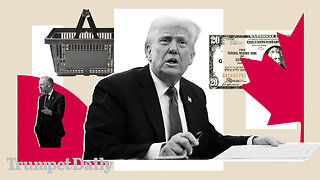Premium Only Content

Tax the Rich, Feed the Poor CC
Wealth Redistribution – A Path to Equality or Economic Disaster?
The phrase "Tax the Rich, Feed the Poor" is more than just a catchy slogan; it reflects a deep debate about how society should share its wealth. Should we take more money from the rich to help those who are struggling? Or does this approach create more problems than it solves? Let’s break it down.
What Does "Tax the Rich, Feed the Poor" Mean?
"Tax the Rich, Feed the Poor" suggests that wealthy people should pay higher taxes. The government would then use this money to help poor people, perhaps by providing food, housing, education, or healthcare. The idea is to make society fairer by reducing the gap between the rich and the poor.
Why Do Some People Support This Idea?
Supporters of "Tax the Rich, Feed the Poor" believe that wealth redistribution can help create a more equal society. Here’s why:
Reducing Poverty: By taxing the rich more, the government can fund programs that help people in need. This could reduce poverty and provide everyone with basic necessities.
Fairness: Some people think it’s only fair that the rich, who often have more money than they need, should help those who are less fortunate. After all, the rich often benefit from a society that allows them to become wealthy in the first place.
Social Stability: Reducing the gap between the rich and the poor can create a more stable and peaceful society. If people feel they have a fair chance at a good life, they are less likely to be angry or frustrated.
What Are the Concerns About This Approach?
While the idea of taxing the rich to help the poor sounds good, some people worry it might cause problems. Here are a few concerns:
Economic Slowdown: Critics argue that higher taxes on the rich could hurt the economy. If wealthy people have less money to invest in businesses, it might slow down economic growth and lead to fewer jobs.
Discouraging Success: Some people worry that if the government takes too much money from the rich, it could discourage people from working hard or being innovative. Why strive for success if much of your earnings will be taxed away?
Government Efficiency: There’s also the question of how well the government would use the money it collects from higher taxes. Some people are concerned that the government might waste it, rather than using it effectively to help those in need.
Is Wealth Redistribution the Answer?
Wealth redistribution is a complex issue with strong arguments on both sides. On one hand, it could help create a more equal society by giving everyone access to basic resources. On the other hand, it might lead to economic problems and reduce incentives for people to work hard and innovate.
The real challenge is finding a balance. How can we ensure that everyone has a fair chance at a good life without hurting the economy or discouraging success? This is a question that societies around the world continue to grapple with.
"Tax the Rich, Feed the Poor" is a powerful idea, but it’s not without its challenges. While wealth redistribution can help create a more equal society, it’s important to consider the potential economic impacts and find a balanced approach. By understanding both sides of the debate, we can work towards solutions that promote fairness and opportunity for everyone.
-
 LIVE
LIVE
Biscotti-B23
1 hour ago🔴 LIVE GLOBKU'S $300 TOURNAMENT 🏆 COMMENTATING LATER ⚔ BLEACH REBIRTH OF SOULS
74 watching -
 LIVE
LIVE
TonYGaMinG
1 hour ago🟢 KHAZAN THE FIRST BERSERKER PART 2 #RumbleGaming
123 watching -
 19:08
19:08
Neil McCoy-Ward
21 hours agoHistory Is Repeating (Get Your House In Order NOW!)
3.17K3 -
 38:02
38:02
The Rich Dad Channel
18 hours agoSuccessfully Scale & Exit Your Business - Tom Wheelwright, Colin Campbell
2.5K -
 10:33
10:33
Cooking with Gruel
21 hours agoSmall Farm Chicken
2.83K2 -
 11:22
11:22
Chrissy Clark
20 hours agoMaking America CLEAN Again I South Dakota Vlog
4683 -
 17:25
17:25
Chris From The 740
4 hours agoThe Cyelee Chameleon: Finally! A Red Dot for Astigmatism!
1.1K1 -
 1:00:11
1:00:11
Trumpet Daily
23 hours ago $3.04 earnedCanada Aims to Inflict as Much Pain as Possible on Americans - Trumpet Daily | Mar. 28, 2025
3.16K14 -
 1:07:00
1:07:00
What's Up Canada?
3 days agoSam Anthony - Challenges and Opportunities on the Front Line of Free Speech in Canada
2.18K7 -
 1:46:34
1:46:34
Game On!
18 hours ago $10.42 earnedMarch Madness Elite 8: The Chalk Continues!
49K